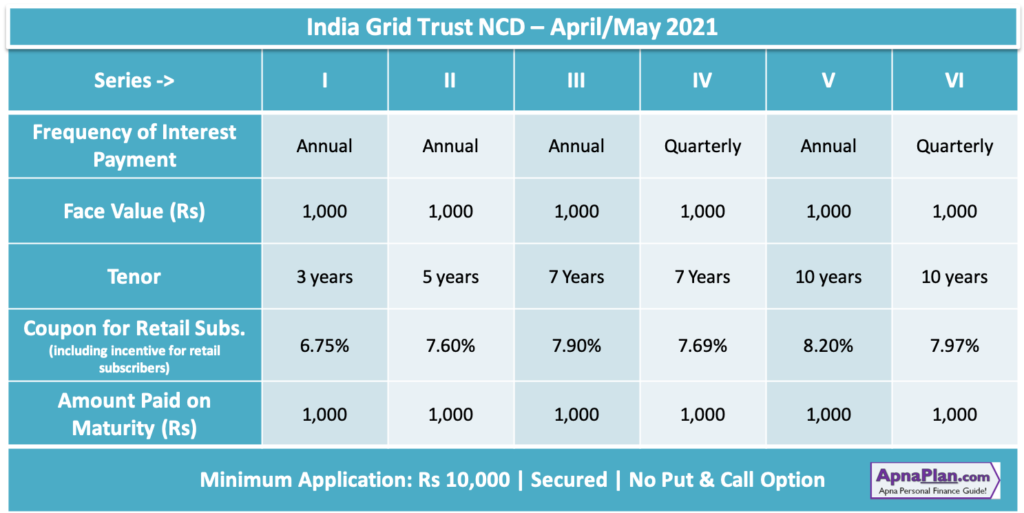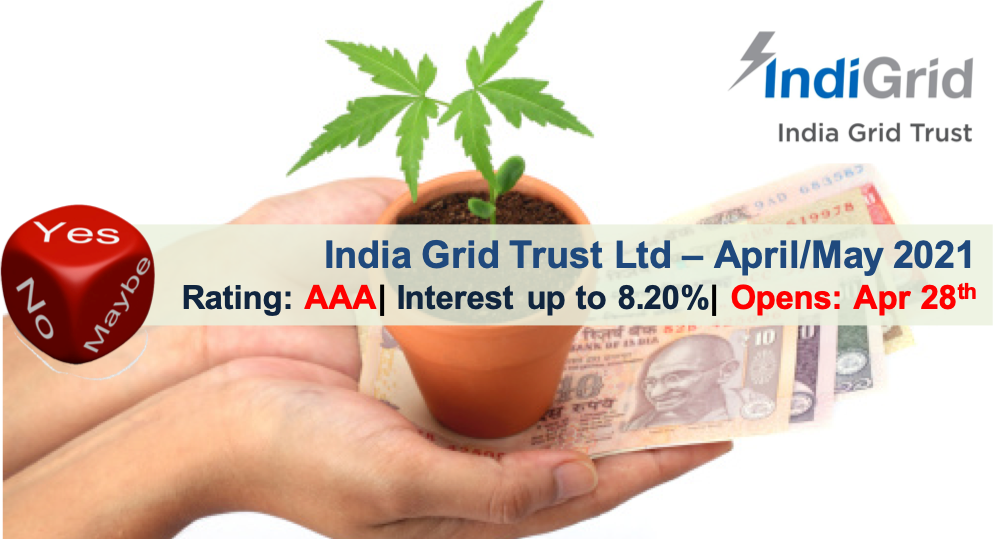India Grid Trust, a power sector InvIT (Infrastructure Investment Trusts) registered with SEBI since 2016 has come out with public issue of non-convertible debentures (NCD) – India Grid Trust NCD offering up to 8.20% interest rate and opens for subscription from April 28, 2021.
India Grid Trust NCD – Significant Points:
- Offer Period: April 28 to May 5, 2021
- Annual Interest Rates for Retail Investors: 6.75% to 8.20% depending on tenure
- Price of each bond: Rs 1,000
- Minimum Investment: 10 Bonds (Rs 10,000)
- Max Investment Limit for Retail Investor: Rs 10 Lakhs
- Credit Rating: ‘CCA AAA/Stable’ by CRISIL, ‘IND AAA’/Stable by India Ratings and ‘ICRA AAA (Stable)’ by ICRA
- NCD Size: Rs. 1000 Crores
- Date of Allocation: May 11, 2021
- Allotment: First Come First Serve
- Listing: Bonds would be listed on BSE & NSE and will entail capital gains tax on exit through secondary market
Learn All about NCDs
NCDs or non-convertible debentures or more popularly known as Bonds are a bit complex investment products. You must understand the product, risk involved, the taxation on interest received and when you sale it. We have done a separate post regarding this titled – Know all about NCDs.
Also you can keep track of upcoming NCD issues here.
India Grid Trust NCD – Investment Options:
There are 8 options of investment in India Grid Trust NCD.

Best way to Double your Money
Who does not want more and wouldn’t you love to Double your money? For sure we all would – we have listed 7 authentic investments which you can use to double your money. The post talks not only about the returns but also the risks associated with each investment.
India Grid Trust NCD – Who can Apply?
This issue is open to all Indian residents, HUFs and Institutions.
- Category I – Institutional Investors – 10% of the issue is reserved
- Category II – Non-Institutional Investors, Corporates – 10% of the issue is reserved
- Category III – HNIs – 30% of the issue is reserved
- Category IV – Retail Individual Investors – 50% of the issue is reserved
However NRIs cannot apply for this NCD.
India Grid Trust NCD Review
Why you should invest in India Grid Trust NCD?
- AAA Credit rating means low likely hood of credit default
- The NCD is secured, which means the above debt is backed by assets of the company
- The interest rates are 2% – 3% higher than your regular Bank FDs
- No TDS if invested in Demat Form
Why you should not invest in India Grid Trust NCD?
- There have been issues with some well rated companies like DHFL, IL&FS where rating agencies suddenly downgrade the rating. This risk always existed but it has come to forefront in last few months
Should you Invest in Gold?
We looked at more than 55 years history of gold to see if its a good idea to invest in Gold. We concluded that its more volatile than perceived but investing in long term may provide you with more stable returns. You can look at the complete analysis and our conclusion here – Looking at Gold Price History in India – Should you Invest in Gold?

How to Apply for India Grid Trust NCD?
You can apply online by ASBA facility provided by banks. It’s the easiest way to apply and also avoids a lot of hassle in terms of KYC and paper work.
How to apply for NCD through ASBA?
If you want to apply to NCDs, ASBA is the best way to do so. It’s easy, secure and the money leaves the account only when the bonds are allocated. We have covered step by step process for ASBA in SBI in the post. You have ASBA facility in most big banks.
In case you don’t want to do it online, you can download the application form from company site or Financial Institutions and submit to collection centers.
Recommendation:
- My recommendation is invest some part of your Fixed Income investment in India Grid Trust NCD Issue
- You should always have diversified portfolio be it fixed deposit, NCD or equity investment
- Its good idea to remain invested till maturity because liquidity on exchanges are low and hence you would get lower than market value
How much Taxes you Need to Pay this Year? Download Our Income Tax Calculator to Know your Numbers
Do you know how much tax you need to pay for the year? Have you taken benefit of all tax saving rules and investments? Should you use the “NEW” tax regime or continue with the old one? In case you have all these questions just Download the Free Excel Income Tax Calculator for FY 2021-22 (AY 2022-23) and get your answers.
India Grid Trust NCD FAQs
✅ How to apply for India Grid Trust NCD?
You can apply online by ASBA facility provided by most banks. It’s the easiest way to apply and also avoids a lot of hassle in terms of KYC and paper work. In case you don’t want to do it online, you can download the application form from company site or Financial Institutions and submit to collection centers.
✅ Is India Grid Trust NCD Secure?
Yes India Grid Trust NCD is secured by its assets and future income.
✅ What is tax on India Grid Trust NCD?
For Tax Purpose NCDs are treated similar to Fixed Deposits. The interest earned is added to your income as “income from other sources” and taxed accordingly.
In case the NCD is sold before maturity on stock exchanges, it would lead to Capital Gains and taxed according to the holding period.
-If the NCD was sold within 12 months of allotment, it leads to Short Term Capital Gains and
-if the selling period is more than 12 months its Long Term Capital Gains
-Short Term Capital Gains would be added to income and taxed accordingly
-Long term capital Gains would be taxed at the flat rate of 10% (u/s 112 of IT Act)
✅ Is India Grid Trust NCD safe to invest?
The credit rating for India Grid Trust NCD is AAA. This is investment grade and less likely to default on principal or interest payment. Do remember that these ratings are as of today and these may change depending on company’s performance and external situations. So investors need to track the company closely.
